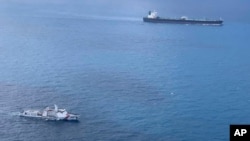The United States has filed a case seeking to seize Iranian oil with suspected links to a terror group aboard a tanker that is en route to an American port.
The complaint, filed in U.S. District Court for the District of Columbia on Tuesday, alleges Iran attempted to hide the origin of the oil by carrying out several ship-to-ship transfers before it was transferred aboard the Liberian-flagged Achilleas tanker originally destined for China, according to a statement Wednesday by the U.S. Department of Justice.
U.S. officials said the transfer scheme involved several entities affiliated with Iran’s powerful Islamic Revolutionary Guard Corps (IRGC) and its elite Quds Force (IRGC-QF). Both groups have been designated as terrorist organizations by the United States.
'Falsified documents'
The Justice Department said those involved in the scheme also “falsified documents, and other means, and provided a fraudulent bill of lading to deceive the owners of the Achilleas into loading the oil in question.”
The Bloomberg news agency reported last month that Achilleas’ Greek owner, Capital Ship Management Corp., alerted U.S. authorities to the possibility that it had unknowingly taken on Iranian crude, after initially thinking it came from Iraq.
In a report published Wednesday, Reuters cited a Capital Ship Management source as saying the Achilleas was now heading to the United States in full cooperation with U.S. authorities. The report also said Refinitiv ship tracking data showed the tanker's last reported position was off the coast of South America and its destination was the U.S. port of Galveston, Texas, with a scheduled arrival on February 15.
John C. Demers, assistant attorney general of the Justice Department’s National Security Division, said in a statement Wednesday that “the forfeiture complaint filed today serves as a reminder that the IRGC and IRGC-QF continue to exert significant control over the sale of Iranian oil.”
“As we have demonstrated in the past, the department will deploy all tools at its disposal to ensure that the IRGC and IRGC-QF cannot use profits from the sale of Iranian oil to fund terrorism and other activities that threaten the safety and security of all Americans,” he added.
Iran uses profits from its oil sector to fund IRGC’s “malign activities,” U.S. officials said.
The complaint against Iran included documents that allege “profits from oil sales support the IRGC’s full range of nefarious activities, including the proliferation of weapons of mass destruction and their means of delivery, support for terrorism, and a variety of human rights abuses, at home and abroad.”
The move to seize the oil cargo came after an investigation by the U.S. Federal Bureau of Investigation (FBI) and the Department of Homeland Security.
“The FBI will continue to prioritize the enforcement of sanctions, and we applaud the efforts of our agents and partners on this investigation,” said Michael F. Paul, special agent in charge of the FBI’s Minneapolis Field Office.
Bloomberg has cited “people familiar with the matter” as saying officials of the former Trump administration issued the seizure order for the Iranian oil in their final days before leaving office on January 20.
Increased sanctions
Under the Trump administration, the U.S. imposed major sanctions against Iran as part of its efforts to stop Tehran’s oil sales, reduce its nuclear program and stop its activities around the Middle East. The administration also withdrew from the Iran nuclear deal in 2018.
The current administration of President Joe Biden has said it is open for a rapprochement with Iran, but last week, U.S. Secretary of State Antony Blinken said Iran must first limit its nuclear activities.
Some experts say that even though the Biden administration has repeatedly said it would reengage with Iran and return to the nuclear deal, it does not want to be criticized by opponents or be accused of being soft on terrorism.
“Violation of human rights, terrorism or Iran’s regional ambitions are not among the topics that the Biden team is willing to turn a blind eye,” Alex Vatanka, an Iran expert at the Middle East Institute in Washington, told VOA.
Vatanka added, “Tehran’s support for terrorism is the last thing Biden is going to venture or gamble on.”
Damon Golriz, a research fellow at The Hague University, believes the Biden administration is “using sanctions as a strategy to keep Iran under pressure and to utilize it as a leverage in further talks and twist the ayatollahs’ arms in order to put IRGC under more scrutiny.”
“This pressure could limit Tehran’s maneuvers in using soft power and diplomacy to further its plans and ambitions,” he said.
VOA Persian’s Michael Lipin contributed to this report.





